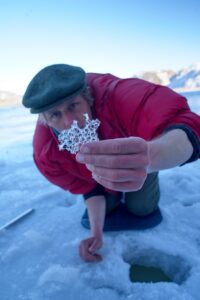Springs as conduits between deep groundwater and surface systems in periglacial landscapes

Climate-induced changes such as the growth of ice sheets and permafrost will alter the ground surface environment and impose a significant perturbation to the geosphere during a time period that is relevant to post-closure safety of nuclear waste repositories – even though planned repository sites are permafrost free under current climate conditions.
The motivation for our research is a need for understanding the potential for transport of deep groundwaters and solutes to the surface in landscapes where permafrost forms and dissipates over glacial time scales. We focus our research efforts on the connections between the sub-glacial and the periglacial landscape hydrological systems and leverage outcomes from the earlier GAP and GRASP field-based projects in Greenland.
Our aim is to advance understanding of the connections and pathways through periglacial groundwater systems to surface waters. A central question regards the location and properties of taliks (permafrost-free ground) such as groundwater springs, and their influence on landscape scale connectivity and pressure gradients. Taliks constitute primary controls for groundwater flow pathways and interactions with surface water, yet fundamental understanding of their formation and persistence remains elusive. To estimate the impact of such connections in relevant settings and timescales, we apply numerical modeling, geophysical investigations, and analysis of water chemistry for periglacial groundwater springs in Greenland and Svalbard. The project started in 2020 with the recruitment of PhD student Mikkel Toft Hornum and is on schedule to be completed in late 2023.
Team
Mikkel Toft Hornum, PhD students, University of Copenhagen
Ylva Sjöberg, Supervisor, Associate Professor, University of Copenhagen
Aart Kroon, co-supervisor, Professor, University of Copenhagen
Emma Johansson, co-supervisor, DHI Sweden
Jan-Olof Selroos, SKB
Publications
Hornum, MT, Betlem, P & Hodson, A 2021, ‘Groundwater Flow Through Continuous Permafrost Along Geological Boundary Revealed by Electrical Resistivity Tomography’, Geophysical Research Letters, vol. 48, no. 14, e2021GL092757. https://doi.org/10.1029/2021GL092757
Hornum, MT, Hodson, AJ, Jessen, S, Bense, V & Senger, K 2020, ‘Numerical modelling of permafrost spring discharge and open-system pingo formation induced by basal permafrost aggradation’, The Cryosphere, vol. 14, no. 12, pp. 4627-4651. https://doi.org/10.5194/tc-14-4627-2020
Last review: October 14, 2019
Last review: October 14, 2019